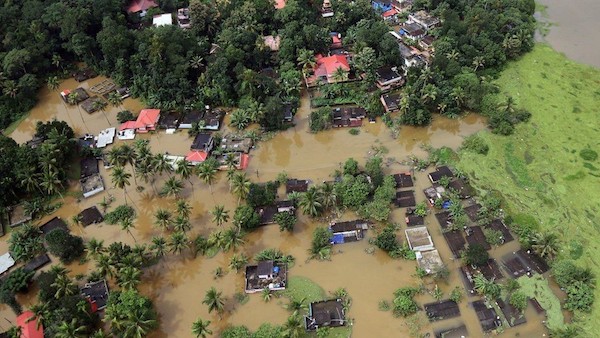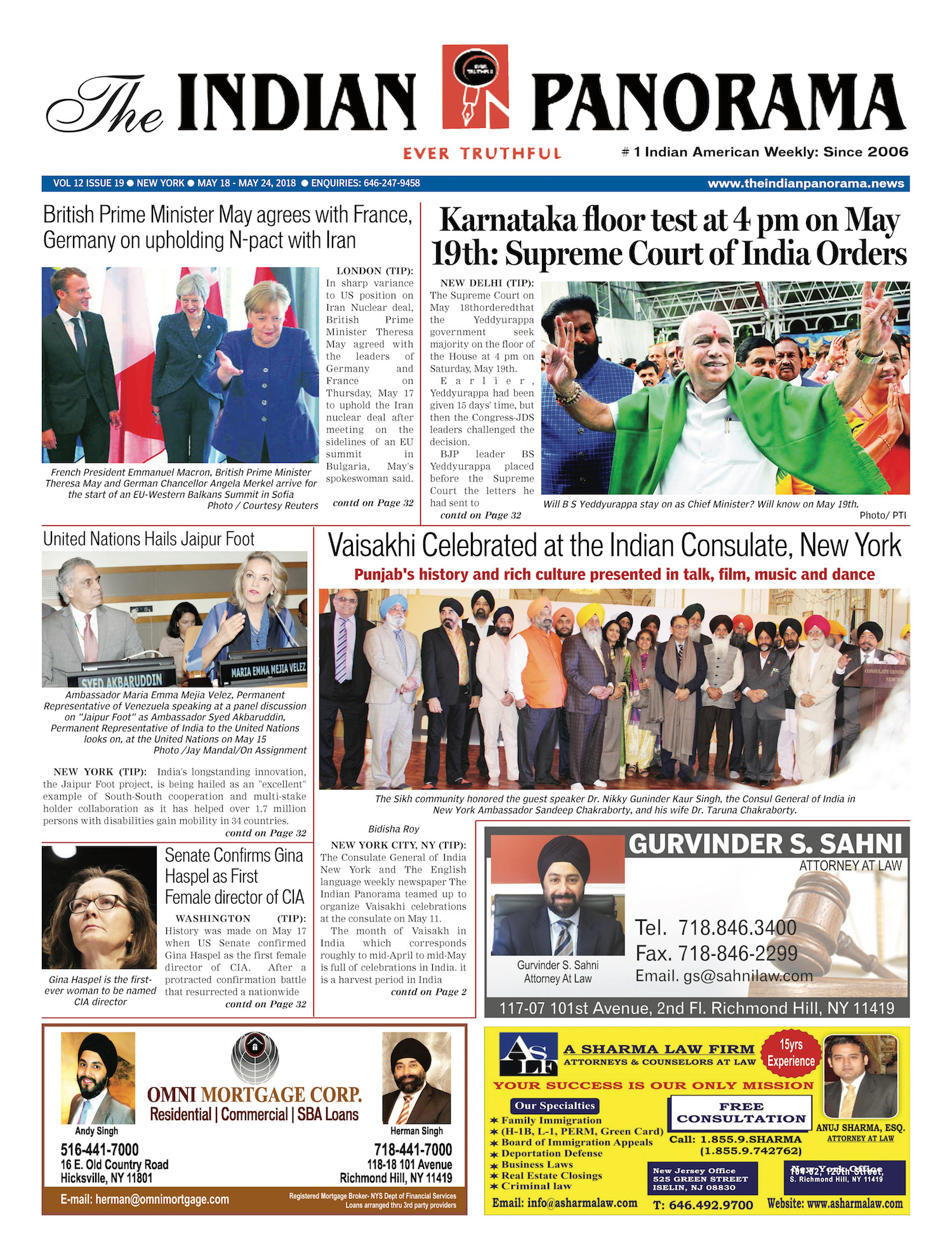
England (TIP): Six Indian Americans are among 35 students from the US selected for the prestigious Gates Cambridge scholarship as reported by Gates Cambridge on Twitter on February 16th .
Under a $210 million endowment from the Bill and Melinda Gates Foundation, the scholarship enables outstanding graduate students from over 100 countries around the world to study at the University of Cambridge.
Gates Cambridge has begun the selection process for our class of 2018. After interviews in Seattle, WA in late January the Gates Cambridge Trust has awarded scholarships to 35 outstanding candidates from across the United States. Names of the candidates from other countries would be announced in April 2018.
The Indian Americans are Neil Davey, Ayan Mandal, Pranay Nadella,Vaithish Velazhahan, Kaamya Varagur and Monica Kullar.
This is what they have to say about their selection and road ahead:
Neil Davey writes ,”Visiting India each summer as I grew up in Maryland, I not only developed a deep appreciation for the beauty of Sanskrit and the rhythm of the Tabla, but also a keen interest in the issue of access to healthcare technology in resource-limited settings. As an undergraduate at Harvard studying Applied Mathematics/Economics with a secondary in Global Health & Health Policy, I founded UniDx, an organization focused on the early-stage diagnosis of infectious diseases using microfluidics-based technology. I traveled to both Peru and India to conduct clinical studies on the low-cost device for individuals with malaria. While there, I found that pure technological solutions were simply not enough to remedy pressing global health problems; rather, a more integrated approach addressing the relevant social, political, and economic barriers was required. Through an MPhil in Technology Policy at Judge Business School, I hope to learn how to better launch technologies in developing countries with a strong understanding of the countries’ local contexts. While at Cambridge, I am particularly excited to interact with faculty who research access to care, as well as be in a community of scholars who will challenge my beliefs and allow me to rethink my perspectives on healthcare. I am so grateful to be joining the Gates Cambridge community, and very eager to be surrounded by a group of intellectuals who are committed to improving the lives of others through scholarship and community engagement.”
Ayan Mandal writes, “In high school, I was interested in the questions surrounding psychology, but more satisfied with answers utilizing biology. Naturally, this predicament led me to neuroscience. At Georgetown University, while pursing majors in Neurobiology and Physics, I studied how different disease states could affect the connectivity of the nervous system. Most of my work centered on stroke, where we investigated how damage to neural structures, particularly white matter tracts, affected language abilities in patients. I also conducted in vitro electrophysiology research and characterized the functional connectivity of neuronal networks corresponding to APOE4, a high risk gene for Alzheimer’s Disease, in comparison to APOE3, the neutral allele. At Cambridge, I will be applying my growing expertise in network neuroscience analysis to uncover brain networks corresponding to states of cognition in patients with brain tumors. We hypothesize that when important pieces of cognitive networks are resected to remove the tumor, predictable surgically induced cognitive deficits will result. This work could inform neurosurgical planning before tumor resection in the future. Ultimately, I hope to become a physician-scientist dedicated to translating key advances in research into the clinic. I am truly honored to join a community of motivated scholars focused on bettering the human condition.”
Pranay Nadella writes, “I grew up in suburban New Jersey as the son of two immigrants from southern India. My father is from a small village called Pedapulivarru, which inspires my passion for health equity in low-resource settings. Growing up, I devoted much of my time to community service. My experience volunteering at a free medical clinic in New Jersey showed me that the same health disparities in my father’s village exist around me in New Jersey. As an undergraduate student at Harvard University, I study Biology and Statistics in order to refine my lens on pressing public health challenges. Through global health coursework, I’ve become very passionate about maternal and child health. As a result, I spent time in Tanzania investigating contributors to delayed vaccination. I lead Harvard’s Partners in Health Engage chapter, which meets with legislators and fundraises to advocate for lifesaving global health programs. Striving to address maternal and child health disparities at home in the U.S. as well, I served as a leader of the National Youth Council of the March of Dimes, a U.S.-based non-profit focused on preventing preterm birth. At Cambridge, I will study the MPhil in Public Health and continue to focus on improving public health programs for vulnerable mothers and children. I’m excited to join the diverse, inspiring and passionate Gates Cambridge community.”
Vaithish Velazhahan writes,” As an undergraduate at Kansas State University double majoring in Medical Biochemistry and Microbiology, I worked in the lab of Dr. Kathrin Schrick where I pursued multiple independent projects. I used biophysical tools to characterize direct targets of dietary flavonoids, which are abundantly found in fruits and vegetables and are known to possess anti-cancerous properties. This project emerged from my quest to understand protein-flavonoid interactions. As the only person conducting this research, I had to teach myself a lot of different techniques and face numerous challenges, but in the process I developed a great love and appreciation for the visualization of protein structures. During my PhD in the MRC Laboratory of Molecular Biology (LMB), I will be using electron cryo-microscopy to uncover new structures of activated states of G protein-coupled receptors (GPCRs). Over 40% of commercially available drugs target GPCRs; therefore, it is important to understand their structures to design new drugs to treat a variety of human diseases. I am very excited to contribute to advances in electron cryo-microscopy, and I am grateful for this opportunity to work alongside and learn from world-class scientists in the LMB. Besides science, I enjoy working towards bridging global health disparities. I have worked with MEDLIFE in Peru and Ecuador, and I also run my own non-profit WE SAVE in India where we are developing technology to connect doctors with underserved patients.”
Kaamya Varagur writes,” I am a scientist and singer pursuing an MPhil at the Cambridge Centre for Music and Science. At Princeton University, I majored in neuroscience with a certificate in vocal performance. As a student of both neuroscience and music, I have always been interested in the scientific study of music’s effects on mind and body. While a dominant narrative within music and medicine focuses on music’s therapeutic effects during the illness state, I am interested in further exploring its impact on healthy individuals, from the perspective of music as a tool to enhance community health. One of the most unique stages of life during which music can exert its effects is in early infancy, when mothers and families of infants can expose their children to an enriching musical environment, which has been shown time and again to have benefits for infants along various developmental avenues. At Cambridge my research will specifically examine the reciprocal effects of infant-directed singing on mother and child, looking at how such music modulates physiological arousal/stress. I plan on pursuing a medical career and hope to engage with community music programs that operate out of healthcare settings throughout my life. In my time at Cambridge I also look forward to participating in its vibrant choral tradition.”
Monica Kullar writes, “I completed my B.Sc. in Psychology at University of California, San Diego, where I trained across diverse labs within psychology and neuroscience. After graduating a year early, I joined Stanford University as a research assistant in the departments of Psychology & Psychiatry and Behavioral Sciences. I explored how neural systems and personal traits are involved in the formation of social networks, as well as how neural mechanisms underlying self-regulation of emotion and cognition may predict positive lifestyle and mood-related changes in depression and obesity. At the University of Cambridge, I aim to conduct research on the effectiveness of down-regulating negative emotions in stressful real-world contexts, and elucidate further on neurobiological models of emotion regulation across both healthy and vulnerable populations. My goal is to advance our understanding on the complexities of managing our emotions and address ways to improve emotional and mental health. Ultimately, my ambition is to pursue an academic career within the growing field of social and affective neuroscience by leading my own laboratory and continuing to drive translational and applied research.”
Here’s Wishing them all Good Luck!
As reported by gatescambridge.org





My Hearty Congrats to Vaitish.